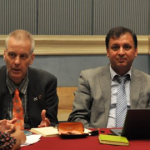
Evidence and policy making in Zimbabwe: new film from ZeipNET
Effective policy making requires strong links between researchers and policymakers. Although evidence-informed policy making (EIPM) is fairly new in Zimbabwe, policymakers and other stakeholders are increasingly talking about how to build an enabling environment to support these links.
ZeipNET has produced a new documentary exploring the nature of policy making in Zimbabwe, featuring interviews with policymakers, political analysts, researchers, civic society practitioners and other opinion leaders who have participated in the BCURE project over the last three years.
Here are some highlights and quotes from the film. Watch it in full here.
Most stakeholders see evidence as a key part of policy making …
Policies are formulated because of a need, that is, certain realities or conditions that have to be either promoted or discouraged.
Government should be well informed of what is affecting the lives of citizens so as to meaningfully address challenges and take advantage of windows of opportunity. This can only be achieved through assessments, evaluations or other credible research processes.
One researcher pointed out there’s a need for objectivity when identifying and addressing societal problems: “We don’t arrive at a question or problem with a solution in mind because we taint the results. Let the facts be the facts, then act accordingly”.
A civic society practioner and policy analyst noted that, “Every policy formulation and implementation [process] must lead to an improvement of the quality of life for the people… This must be the key determinant”.
…but power politics challenge the use of evidence in the Zimbabwean policy making process.
Policy making in Zimbabwe is predominantly characterized by power politics. The process is very reactionary and there is no separation of powers.
The same policy analyst observed “It is an attempt to either protect power or to gain power. That is the main motivation of the policy making process in Zimbabwe”.
A political analyst went on to add, “Parliament is a lame duck”.
This approach to policy making challenges the use of evidence as often it ends up being a pronouncement by the President, a minister or an announcement in Parliament. Sometimes it’s just cobbling of ideas from political party manifestos by a group of ministers prominent at the time and this transforms into a national blue-print from which policies are supposed to be developed.
A former minister had this to say: “Policy making in Zimbabwe is mostly from the gut-feel, from a hunch or common sense basis rather than from evidence”.
Many policies have very little or no bearing on reality therefore very difficult to implement. This is worsened by lack of associated investment in resources and technology.
At the same time, Ministers go and see the President separately regarding policy issues to gain favours. This leads to policy inconsistencies and discord including acrimony among ministers as they fight for turf. Eventually, all this adversely affects the policy framework.
Moving towards inclusivity and transparency
Generally the Zimbabwean government is not inclusive and transparent in formulating policies.
The following comment was made by a Member of Parliament,“ A lot of the time they [the Executive] are very arrogant. They do not necessarily espouse the values of servant leadership. A lot of them just dictate positions and expect everyone to follow”.
However, there are some public or stakeholder consultations that are done, for example during the national budget process, but outcomes are rarely reflected in policy positions. A case in point is the national budget where over half of the budget is on salaries for all civil servants, and the security ministries and Office of the President get around 25% of the budget thereby leaving almost nothing for development issues.
There are exceptions in sectors that are not very politically sensitive. For instance, in coming up with the current gender policy there was direct input from various women’s organizations. Civil society organizations like the Zimbabwe Women Resource Centre and Network (ZWRCN) have Memoranda of Understanding with the Ministry of Women Affairs & Gender Development and the Parliament. This has resulted in a very good gender policy and legislative framework. A Gender Commission was also established to provide an oversight role. However, there’s still a gap between policy formulation and policy implementation, and more needs to be done as well to widely decentralize the consultation process.
Calls for more capacity development
Besides the political powerplay, there is also a lack of technical capacity on the part of Zimbabwe’s bureaucracy.
This was confirmed by a former Cabinet Minister who said, “As long as we do not have the right people in the bureaucracies with the right skills, we lose out. Some of these things go down the cracks and we never get the results we want from these policies”.
Over the past three years ZeipNET, together with its VakaYiko partners has been building the capacity of policy makers in Zimbabwe to engage with, articulate and use evidence in policy processes. Under the BCURE project supported by DFID, ZeipNET has run training programmes in evidence-informed policy making for staff from the Ministry of Youth, Ministry of Industry & Commerce, and Parliament. It has also launched a series of stakeholder engagement initiatives that include policy dialogues and knowledge cafes.
Watch the Documentary here.
Ronald Munatsi is the Executive Director of the Zimbabwe Evidence Informed Policy Network (ZeipNET). ZeipNET is a membership organization. If you are interested in joining or to get updates on upcoming events, please email to: info@zeipnet.org. You can also follow ZeipNET on Twitter or Facebook. This blog post was first published here.
The views expressed in this article are the author’s personal views and not necessarily the views of the organization.
The author can be contacted at: ronald@zeipnet.org Skype: ronald.munatsi , Twitter: ronald_263.

 Next Post
Next Post


